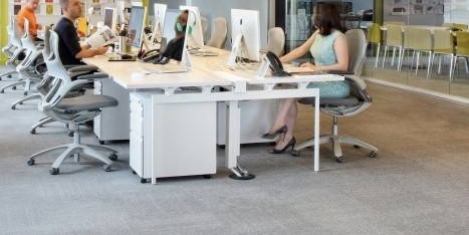March 27, 2017
Up to a third of UK jobs to be displaced by robots in near future 0
 The latest report to examine the disruptive potential of robots in the workplace has been published by PwC as part of the firm’s regular Economic Outlook series. The study claims that up to 30 percent of existing UK jobs will be susceptible to automation by robots and Artificial Intelligence by the early 2030s, although in many cases the nature of jobs will change rather than disappear and the change will increase productivity and wealth. This is lower than the US at 38 percent and Germany at 35 percent, but higher than Japan at 21 percent. The report looks in detail at the composition of jobs in different industry sectors and occupations, using machine learning techniques to model the potential impact of AI in the future based on OECD data. The likelihood of automation appears highest in sectors such as transport, manufacturing, and wholesale and retail, and lower in education, health and social work.
The latest report to examine the disruptive potential of robots in the workplace has been published by PwC as part of the firm’s regular Economic Outlook series. The study claims that up to 30 percent of existing UK jobs will be susceptible to automation by robots and Artificial Intelligence by the early 2030s, although in many cases the nature of jobs will change rather than disappear and the change will increase productivity and wealth. This is lower than the US at 38 percent and Germany at 35 percent, but higher than Japan at 21 percent. The report looks in detail at the composition of jobs in different industry sectors and occupations, using machine learning techniques to model the potential impact of AI in the future based on OECD data. The likelihood of automation appears highest in sectors such as transport, manufacturing, and wholesale and retail, and lower in education, health and social work.










 Accommodation and food services, manufacturing, and transport industries will be hardest hit by limits on movement of EU and non-EU workers following Brexit, a new report has claimed. The latest edition of Mercer’s
Accommodation and food services, manufacturing, and transport industries will be hardest hit by limits on movement of EU and non-EU workers following Brexit, a new report has claimed. The latest edition of Mercer’s 










 A majority (84 percent) of British employees use their smartphones at work, with 78 percent regularly responding to text messages during working hours and on average spending as many as 120 hours per year using their smartphones during the working day claims new research. The data, compiled by LaptopsDirect.co.uk, also found that 59 percent regularly take personal phone calls whilst working; 52 percent admit to answering instant messages via platforms such as Whatsapp and Facebook, and 9 percent have sent a Snapchat from their workplace. Employers are not completely against the use of smartphones, though under half (44 percent) permit the reasonable use of smartphones, according to the research; but 14 percent of respondents admit to having been told off for using smartphones at work, and 4 percent have been disciplined for use of their own tech during work time. Of most concern for employers is the fact that more than a third (38 percent) of respondents regularly check their social media accounts while at work.
A majority (84 percent) of British employees use their smartphones at work, with 78 percent regularly responding to text messages during working hours and on average spending as many as 120 hours per year using their smartphones during the working day claims new research. The data, compiled by LaptopsDirect.co.uk, also found that 59 percent regularly take personal phone calls whilst working; 52 percent admit to answering instant messages via platforms such as Whatsapp and Facebook, and 9 percent have sent a Snapchat from their workplace. Employers are not completely against the use of smartphones, though under half (44 percent) permit the reasonable use of smartphones, according to the research; but 14 percent of respondents admit to having been told off for using smartphones at work, and 4 percent have been disciplined for use of their own tech during work time. Of most concern for employers is the fact that more than a third (38 percent) of respondents regularly check their social media accounts while at work.











